9 Natural Ways To Grow Forehead Hair
Say goodbye to your receding hairline with some simple ingredients from your pantry!

Image: Midjourney/ StyleCraze Design Team
If a receding hairline gives you sleepless nights, do not worry. There are ways to grow forehead hair back. Many factors can cause this hair loss on the forehead, including genetics, medications, stress, hormones, poor nutrition, and alopecia. This article discusses ways to help you regrow hair on your forehead naturally and tips to maintain your hair and prevent hair loss. Keep reading to learn more.

In This Article
Is It Possible To Grow Hair On The Forehead?
While it is not possible to grow hair on the entire forehead, you may be able to grow hair back on a receding hairline. Dealing with the situation promptly may help reduce the risk of baldness. A few medications, herbal solutions, and other natural methods may help reduce hair loss and stimulate hair growth at the hairline on the forehead.
- Herbs For Hair Loss: Herbs are very effective in decreasing hair loss, stimulating hair growth, and keeping the hair and scalp healthy. Herbs like seaweed, ginkgo biloba, saw palmetto, and green tea, among others, help prevent hair loss (1). You can use them as herbal infusions, hair tonics, and rinses, or even add them to other hair care products. Incorporating herbs for hair growth in your daily hair care routine is a must to enhance your hairline.
- Medications For Hair Loss: Medications like topical minoxidil and finasteride are often prescribed to treat hair loss and promote hair growth (2). Dr. Emmanuel R Loucas, MD, Assistant Clinical Professor of Dermatology, says, “In the receding hairline patient, we often suggest the use of topical minoxidil solution, which increases blood flow to the area and may help to increase hair growth in those areas.” Your doctor may also prescribe oral or topical finasteride, depending on the type of hair loss that is causing the hairline to recede. An androgen inhibitor, like spironolactone, might be prescribed to prevent androgenic alopecia (2).
- Hair Masks: You can try homemade or store-bought hair masks to stimulate hair growth. These hair masks contain natural ingredients like banana, aloe vera, coconut oil, among others that nourish and fortify your hair follicles and cleanse your scalp. Most of these ingredients contain antioxidant, antifungal, or anti-inflammatory properties that benefit hair and scalp health.
- Hair Oils: One of the best ways to stimulate your hair growth is to oil your hair regularly (3). Coconut Oil, apricot oil, castor oil, jojoba oil, olive oil, and argan oil are important for hair care. You can also pair these carrier oils with essential oils of peppermint, rosemary, sage, and lavender (4), (5). These essential oils have properties that can improve scalp health.
- Scalp Massages: Try daily scalp massages for hair growth, as it is a proven method that encourages new hair to grow. It can improve hair thickness, density, and length. It also may stimulate hair growth by increasing blood flow (6).
- Aromatherapy: Research indicates that aromatherapy can treat hair loss and stimulate hair growth (7), (8). Pairing an essential oil with a carrier oil is the best treatment of aromatherapy.
Read on to know certain home remedies that may help stimulate hair restoration on a receding hairline.
Key Takeaways
- Seaweed, ginkgo biloba, saw palmetto, and green tea can prevent hair loss.
- Scalp massages can enhance hair thickness, density, and length. They increase the flow of blood, thereby stimulating hair growth.
- Using ginseng, aloe vera, and rosemary with coconut oil can help you grow hair naturally.
How To Naturally Grow Hair On A Receding Hairline
Discover 9 simple yet effective ways to grow forehead hair right here! These home remedies help nourish the scalp and promote healthy hair growth without carrying major adverse effects. However, remember to do a patch test first to prevent any allergic reactions.
1. Aloe Vera
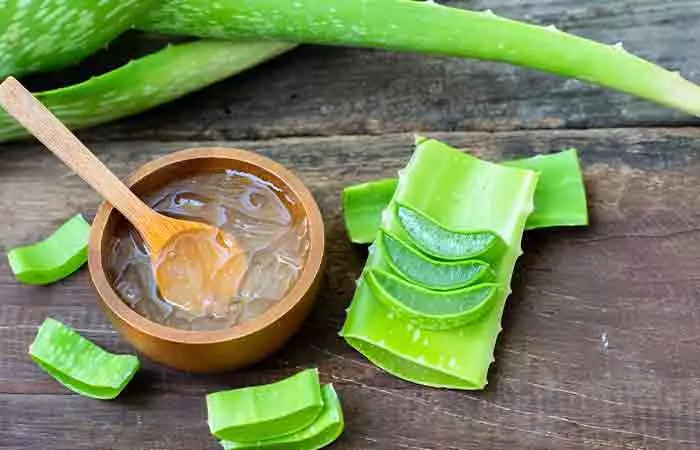
You Will Need
- 2 tablespoons of aloe vera gel
Processing Time
2 hours
Process
- Slice the aloe vera stem and scoop out two tablespoons of the gel.
- Apply the extracted gel to your scalp and gently massage it for a couple of minutes.
- Leave the gel in your hair for 2 hours and wash it off with a mild shampoo.
How Often?
Repeat this twice a week.
Why It Works
Aloe vera has proteolytic enzymesi Enzymes secreted by the pancreas, which help in proteolysis, or the breakdown of proteins from the diet in the digestive tract. that remove dead cells from the scalp and stimulate hair growth.
The plant also moisturizes the scalp and balances its pH. It can also be used to soothe inflammation and treat dandruff (9).
2. Ginseng
You Will Need
2 to 3 tablespoons of ginseng-infused oil
Processing Time
45 minutes
Process
- Pour three tablespoons of the ginseng-infused oil into a bowl.
- Section your hair and start massaging the oil into your scalp.
- Work the oil into your hair, across its whole length.
- Massage your scalp for 10 minutes.
- Leave the oil in your hair for 30 more minutes and rinse it out with a mild shampoo.
How Often?
Repeat this thrice a week.
Why It Works
Chinese red ginseng may help treat alopecia. It inhibits 5-alpha reductase (an enzyme believed to cause hair loss) and improves blood circulation (10). It can also be used as a hair tonic to nourish and strengthen hair (1).
3. Rosemary And Coconut Oil

You Will Need
- 5 to 10 drops of rosemary essential oil
- 2 to 3 tablespoons of a carrier oil
Processing Time
45 minutes
Process
- Combine the rosemary essential oil with a carrier oil (such as coconut, olive, almond, or jojoba oils) in a bowl.
- Massage this oil blend into your scalp and work it through your hair.
- Massage your scalp for 10 minutes.
- Leave the oil in your hair for 30 minutes and rinse with a mild shampoo.
How Often?
Repeat this thrice a week.
Why It Works
Rosemary is as effective as topical minoxidil in treating androgenic alopeciai A genetically predisposed disorder due to an excessive response to androgens that leads to permanent hair loss in both men and women. and stimulating healthy hair growth (5). Using rosemary oil in the place of minoxidil does not cause scalp irritation. The herb extract was also found to induce hair growth in mice and potentially treat alopecia (11), (12). Coconut oil can penetrate the hair follicles and prevent hair protein loss (13).
Duro Cubillo, a skin and hair care YouTuber, shared her experience of using rosemary water on her hair for 7 days. She noticed that her hair felt silky, looked shinier, and even appeared slightly darker with reduced hair shedding during washing. She says, “If you struggle with oily hair, dandruff, or excessive hair shedding, rosemary rinses might be able to help (i).”
 Quick Tip
Quick Tip4. Indian Gooseberry And Lemon Juice
You Will Need
- 4 tablespoons of Indian gooseberry powder
- 2 teaspoons of lemon juice
- Water, as needed
Processing Time
20 minutes
Process
- Add water to the Indian gooseberry powder and lemon juice and mix in a bowl. You must get a smooth, consistent paste.
- Massage the mixture into your scalp and apply it to the whole length of your hair.
- Let it sit for 15 minutes and rinse with a mild shampoo.
How Often?
Repeat this twice a week
Why It Works
The Indian gooseberry is known for its high vitamin C content that boosts collageni A protein found in connective tissues, skin, bone, and cartilage that provides structural support and strength to tissues. production. Increased collagen production stimulates faster and healthier hair growth (14).
5. Egg Mask
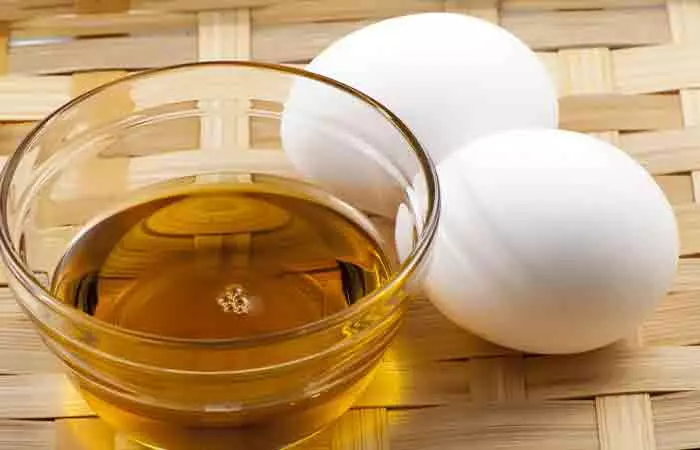
You Will Need
- 1 egg
- 1 cup of milk
- 2 tablespoons of lemon juice
- 2 tablespoons of olive oil
Processing Time
20 minutes
Procedure
- Whisk the egg and mix it with the other ingredients.
- Apply the mixture to your hair and scalp.
- Cover your hair with a shower cap and let the mixture sit in your hair for 20 minutes.
- Wash it off with cold water.
Alternatively, you can also use only eggs and follow these steps:
- Beat a few eggs together till the yolk and the whites are well blended.
- Massage it into your hair and scalp.
- Leave it on for 15 to 20 minutes.
- Rinse it off with lukewarm water.
How Often?
Repeat this twice a week
Why It Works
Eggs are packed with nutrients and protein that boost hair health. They work well with all hair types and provide nourishment to hair. They also contain B vitamins (biotin, especially) essential for hair growth (15). The egg yolk was also found to stimulate hair growth in dermal papilla cells (16).
6. Banana Hair Mask
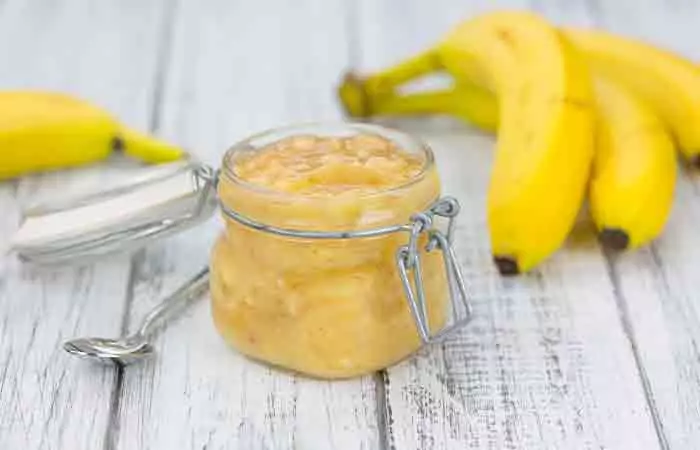
You Will Need
- 2 ripe bananas
- 1 tablespoon of olive oil
- 1 tablespoon of coconut oil
- 1 tablespoon of honey
Processing Time
30 minutes
Procedure
- Mix all the ingredients in a bowl to a smooth consistency.
- Apply the mixture to your scalp and hair.
- Let the mixture sit for 20 to 30 minutes.
- Wash with lukewarm water.
How Often?
Repeat this twice a week
Why It Works
Bananas are rich in potassium, antioxidants, natural oils, and vitamins, and are an ideal treatment for hair loss (17). They also contain silicone that protects the outer hair shaft from damage (18). They are found all year round and make an amazing hair mask for hair loss.
7. Yogurt Hair Mask
You Will Need
- 1 cup of yogurt
- 1 tablespoon of apple cider vinegar
- 1 tablespoon of honey
Procedure
- Mix the ingredients in a bowl.
- Apply the mixture from the roots to the tips of your hair.
- Let the mixture sit for 15 minutes and wash your hair with cold water.
How Often
Once a week
Why It Works
Yogurt helps preserve hair endings and reduces the risk of hair damage and baldness (19). It also may enhance hair color and act as a hair conditioner. Yogurt keeps hair in the anagen phase (active hair growth phase) for longer and gives it a shiny coat (20).
8. Avocado Hair Mask
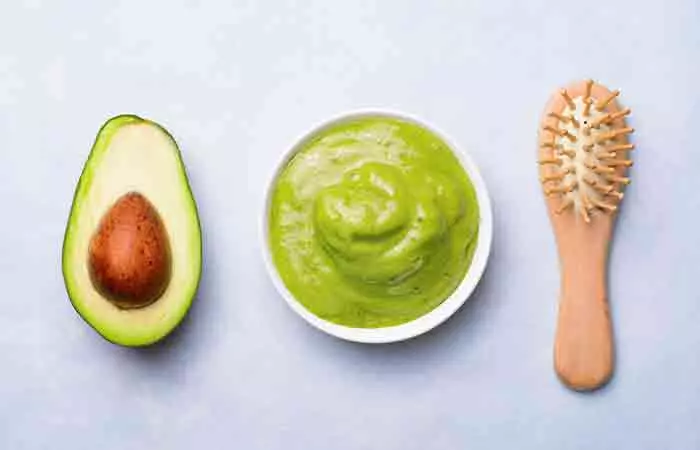
You Will Need
- 1 small ripe avocado
- 1/2 cup of milk
- 1 tablespoon of olive oil
- 1 tablespoon of almond oil
Procedure
- Blend the ingredients until the mixture develops a smooth consistency.
- Apply from the roots to the tips of your hair.
- Keep the mixture on for 15 minutes and wash with cold water.
Why It Works
Avocado is rich in omega-3 fatty acids, vitamin B, niacin, iron, and vitamin C that are important for healthy hair growth (21), (22). It also inhibits 5-alpha-reductase, an enzyme known to cause hair loss (23). Apply avocado mask once or twice a week to improve your hair texture and sheen.
9. Fenugreek Seeds
You Will Need
- 2 tablespoons of fenugreek seeds
- Water
Procedure
- Soak the fenugreek seeds in water overnight or for at least 6-8 hours.
- Grind the seeds to make a smooth paste.
- Apply the paste to your hair and scalp.
- Wait for approximately 30-45 minutes.
- Rinse it off thoroughly with water.
How Often
Do this once a week.
Why It Works
Fenugreek seeds are a good source of iron and protein, which are crucial for promoting hair growth. Additionally, they contain flavonoids and saponins known for their anti-inflammatory and antifungal qualities (24). Although there is limited direct research on the correlation between fenugreek seeds and hair growth, an animal study demonstrated that a topical herbal treatment using an oil blend containing fenugreek seed extract led to increased hair growth. The study suggested that this extract may serve as an alternative to minoxidil, a well-known hair growth medication (25).
In the following section, we have listed certain tips that may help prevent your hair loss.
How To Prevent Hair Loss: Maintenance Tips
Hair loss can occur due to a variety of reasons, such as stress, hormonal imbalance, nutritional deficiencies, genetics, or lifestyle habits. The following tips highlight some of these causes and address how to manage or prevent associated hair loss more effectively. Continue reading to learn more.
- Consider Nutrition Supplementation: One major cause of hair loss in women is nutrient deficiency. A deficiency of zinc, iron, or calcium may cause hair loss. Have a balanced diet with fruits, vegetables, and meat that provides you with the essential nutrients. You may also opt for oral supplements after consulting your healthcare provider.
- Avoid Over-Grooming: Styling your hair too often with heat or chemicals can lead to hair damage and hair loss. Stop using heat and chemicals until you notice substantial hair growth. Do not wear tight hairstyles that pull on your hair roots as they can cause hair loss.
- Brush Gently: Brushing your hair gently can go a long way in preventing hair loss. Harshly combing your hair may lead to hair shedding and loss.
- Follow A Hair Care Regimen: A regular hair care regimen improves hair health. Oil your hair regularly. Get periodic trims to prevent split ends. Use hair masks and hair packs to nourish and hydrate your hair.
- Use Hair Products: Use hair products that cater to the needs and issues of your specific hair type. Hair products meant for straight hair will not work for wavy or curly hair types and vice versa. Use products meant to treat your specific hair issues. For instance, use a hydrating shampoo or a mask if you have dry hair.
- Use Heat Protection: Heat can damage your hair and leave it vulnerable to more harm. It also may cause hair breakage. Use a heat protectant before using any heat styling tools.
- Be Wary Of Hair Dyes: The chemicals in traditional hair dyes may cause hair loss. Instead, opt for natural hair colorants like vegetable hair dyes.
- Exercise Regularly: Stress also may cause hair loss. Opt for exercising, yoga, Pilates, or meditation. Regular exercise can alleviate stress and relax the body. Also, take breaks and engage in hobbies or activities you enjoy to recharge and relax.
Infographic: Top 5 Natural Remedies For A Receding Hairline
No one wants their hair to recede! The panic that sets in when you notice your hairline receding is just too much to handle. But, as mentioned above, there are many hair supplements and remedies available to help you stimulate hair regrowth at your hairline.
To make things easier for you, we’ve handpicked a list of the top 5 ingredients that you should keep handy! Check out the below infographic to know which ones they are.
Some thing wrong with infographic shortcode. please verify shortcode syntax
 Quick Tip
Quick TipLet’s recap the many ways to grow forehead hair, i.e., regrow a receding hairline. If your receding hairline is caused by medical issues, there are many medical treatments you can opt for, such as minoxidil and finasteride. Herbs like seaweed and saw palmetto are known to aid hair growth. Practicing a regular hair care routine that consists of using hair oils and masks and massaging the scalp can greatly improve hair growth. You can also try aromatherapy to treat hair loss. You can make hair masks at home with the natural ingredients mentioned above, such as aloe vera, to regrow a receding hairline.
Frequently Asked Questions
What dietary changes can support hair growth?
Since the hair is mainly made up of protein, consuming foods high in protein, such as lean meats, fish, and eggs, can help strengthen hair and promote hair growth. Also add in essential vitamins and minerals like biotin, iron, zinc, and omega-3 fatty acids through foods like leafy greens, nuts, and seeds (21).
What is the age limit for hair growth?
Dr. Loucas says, “There is no age limit for hair growth, but as you get older, your metabolism slows and various therapies may become less effective.”
Does onion juice regrow forehead hair?
Onion juice can promote hair regrowth at the forehead hairline. It stimulates hair growth by boosting the level of an antioxidant enzyme called catalase. This enzyme optimizes the hair growth cycle. It also contains sulfur, which can regenerate hair follicles.
Does rice water grow forehead hair?
Rice water contains amino acids, which may regenerate hair and stimulate faster hair growth.
Does castor oil grow forehead hair?
Yes, castor oil may help grow forehead hair. It contains vitamin E and omega-6 fatty acids, which may regenerate hair.
Illustration: Natural Ways To Grow Forehead Hair

Image: Stable Diffusion/StyleCraze Design Team
Learn how to regrow hair on your forehead naturally. No expensive treatments or products are needed. Watch this video to find out how.
Personal Experience: Source
StyleCraze's articles are interwoven with authentic personal narratives that provide depth and resonance to our content. Below are the sources of the personal accounts referenced in this article.
i. I tried ROSEMARY WATER on my hair for 7 DAYS & THIS HAPPENED! *before & after results*https://www.youtube.com/watch?v=J-x8zYkVpqE
References
Articles on StyleCraze are backed by verified information from peer-reviewed and academic research papers, reputed organizations, research institutions, and medical associations to ensure accuracy and relevance. Read our editorial policy to learn more.
- Herbal Medicines as an Effective Therapy in Hair Loss a Review
https://www.rjpbcs.com/pdf/2010_1(3)/90.pdf - The Efficacy and Safety of Oral and Topical Spironolactone in Androgenetic Alopecia Treatment: A Systematic Review
https://www.ncbi.nlm.nih.gov/pmc/articles/PMC10010138/ - Hair Oils
https://link.springer.com/chapter/10.1007/978-3-319-29419-3_2 - Peppermint Oil Promotes Hair Growth Without Toxic Signs
https://www.ncbi.nlm.nih.gov/pmc/articles/PMC4289931/ - Rosemary Oil Vs Minoxidil 2% for the Treatment of Androgenetic Alopecia: a Randomized Comparative Trial
https://pubmed.ncbi.nlm.nih.gov/25842469/ - Standardized Scalp Massage Results in Increased Hair Thickness by Inducing Stretching Forces to Dermal Papilla Cells in the Subcutaneous Tissue
https://www.ncbi.nlm.nih.gov/pmc/articles/PMC4740347/ - Essential Oils Used in Aromatherapy: a Systemic Review
https://www.sciencedirect.com/science/article/pii/S2221169115001033 - Randomized Trial of Aromatherapy Successful Treatment for Alopecia Areata
https://jamanetwork.com/journals/jamadermatology/fullarticle/189618 - Taxonomy, Etymology & Uses of Aloe Vera
https://www.rroij.com/open-access/taxonomy-etymology–uses-of-aloe-vera.pdf - Herbal Preparations for the Treatment of Hair Loss
https://link.springer.com/article/10.1007/s00403-019-02003-x - Promotion of Hair Growth by Rosmarinus Officinalis Leaf Extract
https://pubmed.ncbi.nlm.nih.gov/22517595/ - Rosemary ( Rosmarinus Officinalis L., Syn Salvia Rosmarinus Spenn.) and Its Topical Applications: a Review
https://pubmed.ncbi.nlm.nih.gov/32455585/ - Effect of Mineral Oil, Sunflower Oil, and Coconut Oil on Prevention of Hair Damage
https://pubmed.ncbi.nlm.nih.gov/12715094/ - Hair Is an Accoutrement, Hair Is Jewelry, Its an Accessory- Realize the Killing Effects of Shampoo
https://www.plantsjournal.com/archives/2017/vol5issue2/PartD/5-2-29-448.pdf - The Golden Egg: Nutritional Value, Bioactivities, and Emerging Benefits for Human Health
https://www.ncbi.nlm.nih.gov/pmc/articles/PMC6470839/ - Naturally Occurring Hair Growth Peptide: Water-Soluble Chicken Egg Yolk Peptides Stimulate Hair Growth Through Induction of Vascular Endothelial Growth Factor Production
https://www.liebertpub.com/doi/abs/10.1089/jmf.2017.4101?cookieSet=1 - Bananas
https://nutritionsource.hsph.harvard.edu/food-features/bananas/ - Hair Cosmetics: an Overview
https://www.ncbi.nlm.nih.gov/pmc/articles/PMC4387693/ - Ethnopharmacological Survey of Home Remedies Used for Treatment of Hair and Scalp and Their Methods of Preparation in the West Bank-Palestine
https://www.ncbi.nlm.nih.gov/pmc/articles/PMC5499037/ - Probiotic Bacteria Induce a glow of Health
https://www.ncbi.nlm.nih.gov/pmc/articles/PMC3547054/ - The Role of Vitamins and Minerals in Hair Loss: a Review
https://www.ncbi.nlm.nih.gov/pmc/articles/PMC6380979/ - Nutritional and Pharmaceutical Benefits of Avocado Plant
https://www.researchgate.net/publication/329388661_NUTRITIONAL_AND_PHARMCEUTICAL_BENIFITS_OF_AVOCADO_PLANT - Alopeciareason and possible treatments
https://medcraveonline.com/MOJDDT/MOJDDT-02-00062.pdf - A small plant with big benefits: Fenugreek (Trigonella foenum-graecum Linn.) for disease prevention and health promotion
https://pubmed.ncbi.nlm.nih.gov/28266134/ - Development and Evaluation of Herbal Formulations for Hair Growth
https://www.hindawi.com/journals/jchem/2008/674598/
Read full bio of Dr. Somodyuti Chandra
- Dr. Emmanuel (Michael) R. Loucas, MD, is a board-certified dermatologist with 27 years of experience in general and cosmetic dermatology. He is a Fellow of the AAD, American Society for Dermatologic Surgery, and American Society for Laser Medicine and Surgery. His professional interests include skin cancer, medical dermatology, skin laser surgery, skin rejuvenation, facial augmentation, and PRP.
 Dr. Emmanuel (Michael) R. Loucas, MD, is a board-certified dermatologist with 27 years of experience in general and cosmetic dermatology. He is a Fellow of the AAD, American Society for Dermatologic Surgery, and American Society for Laser Medicine and Surgery. His professional interests include skin cancer, medical dermatology, skin laser surgery, skin rejuvenation, facial augmentation, and PRP.
Dr. Emmanuel (Michael) R. Loucas, MD, is a board-certified dermatologist with 27 years of experience in general and cosmetic dermatology. He is a Fellow of the AAD, American Society for Dermatologic Surgery, and American Society for Laser Medicine and Surgery. His professional interests include skin cancer, medical dermatology, skin laser surgery, skin rejuvenation, facial augmentation, and PRP.
Read full bio of Anjali Sayee
Read full bio of Ramona Sinha
Read full bio of Krati Darak







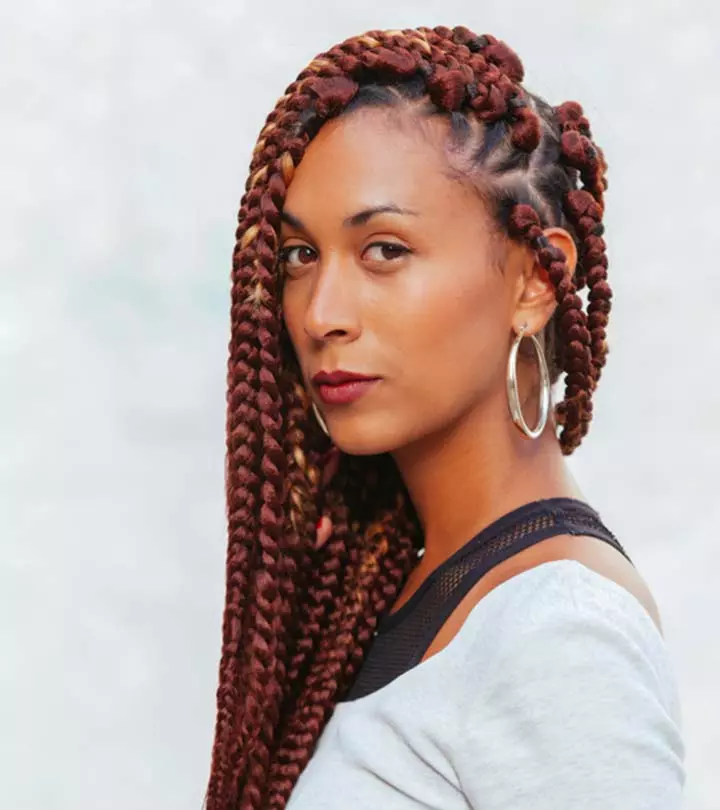
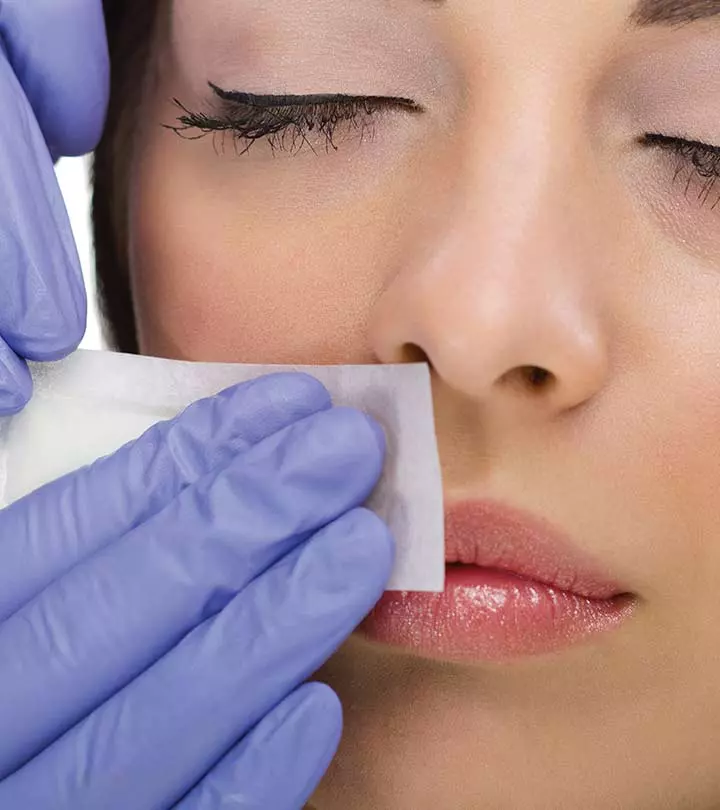
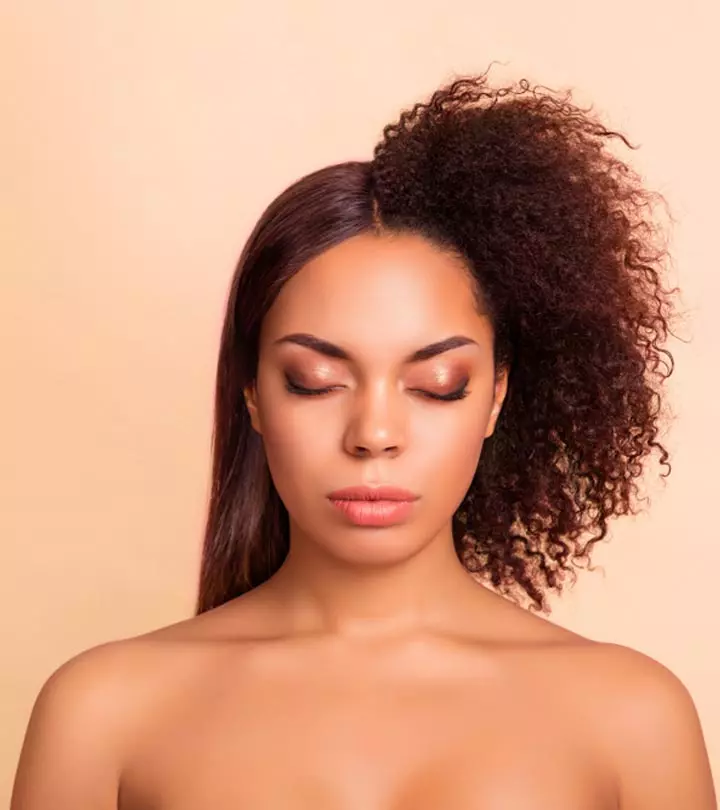
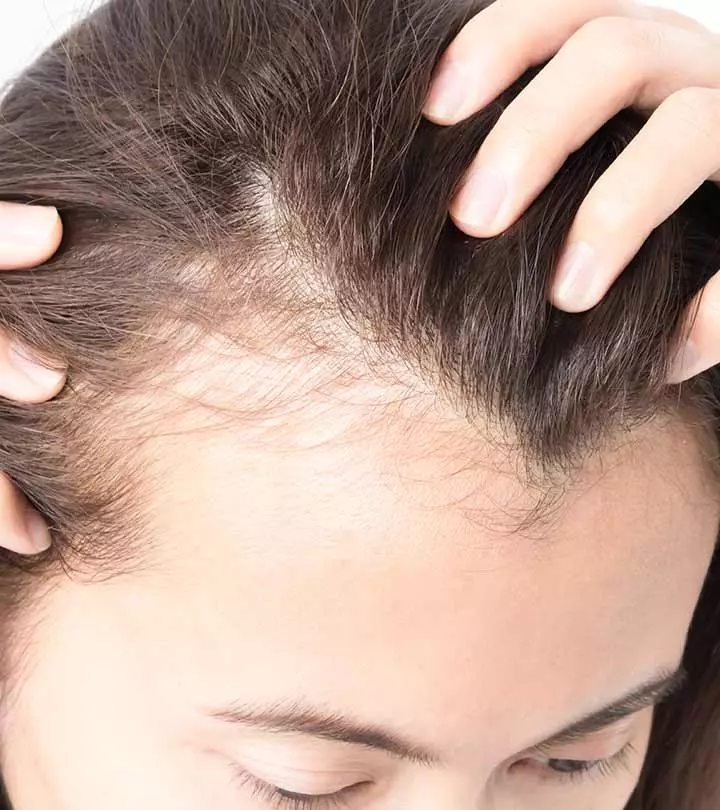





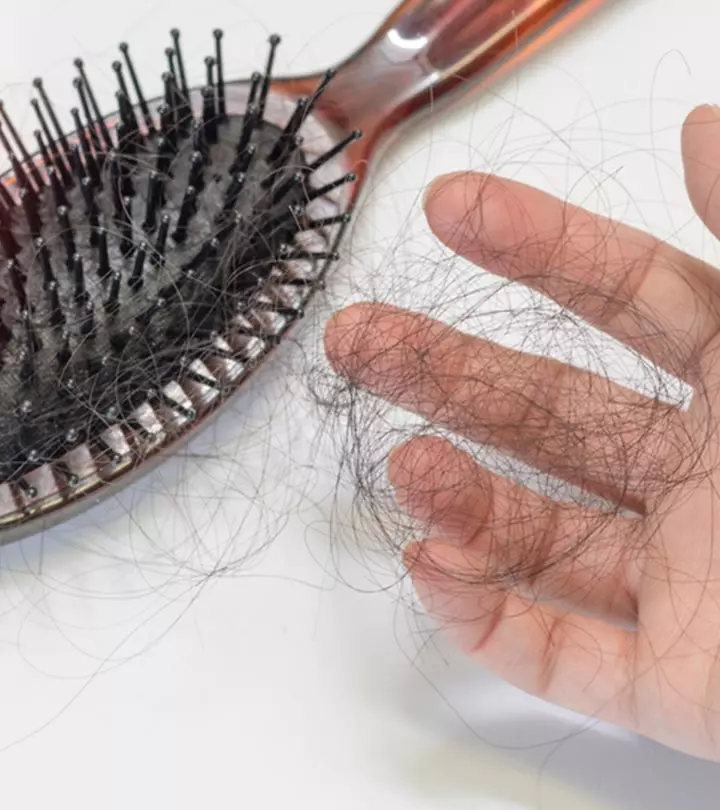
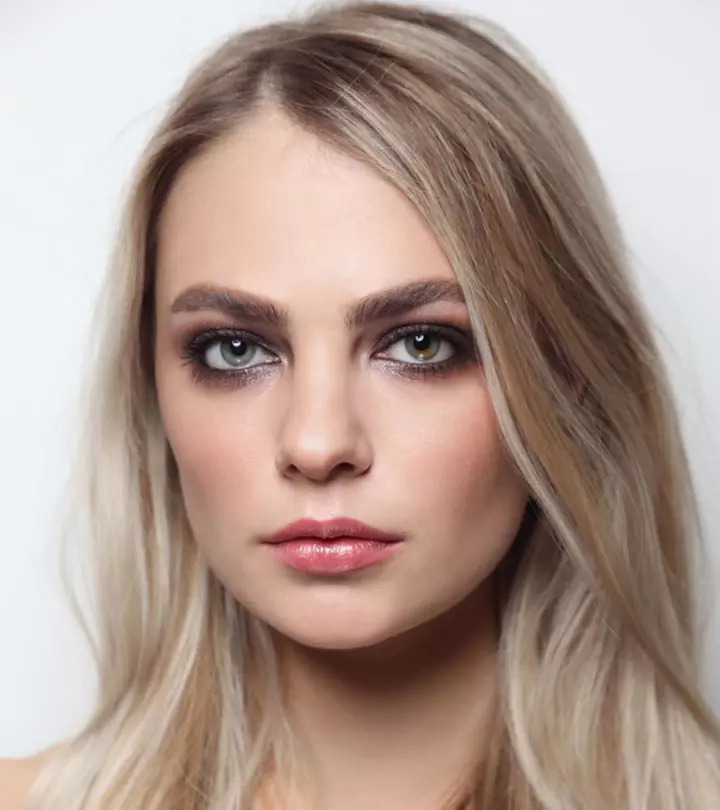

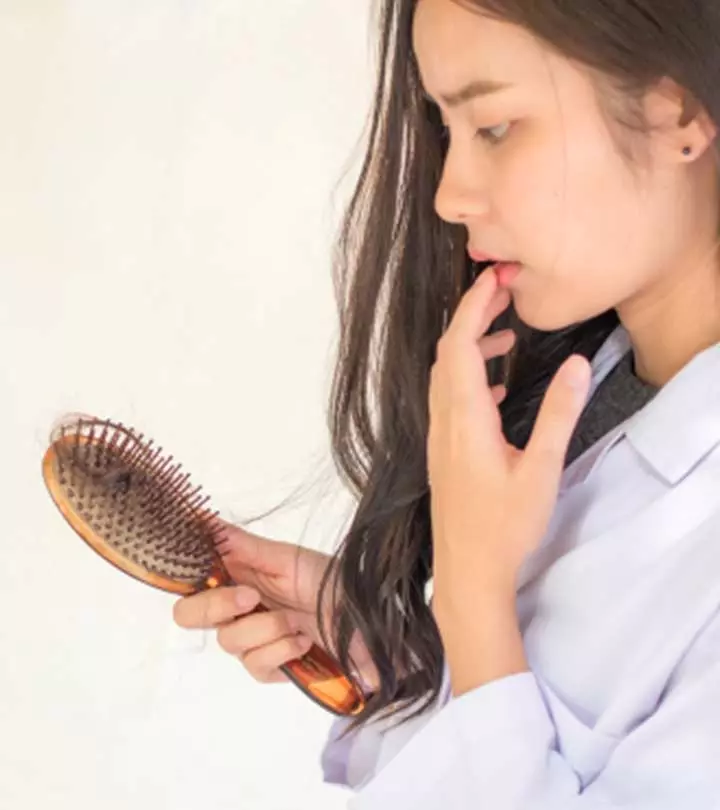
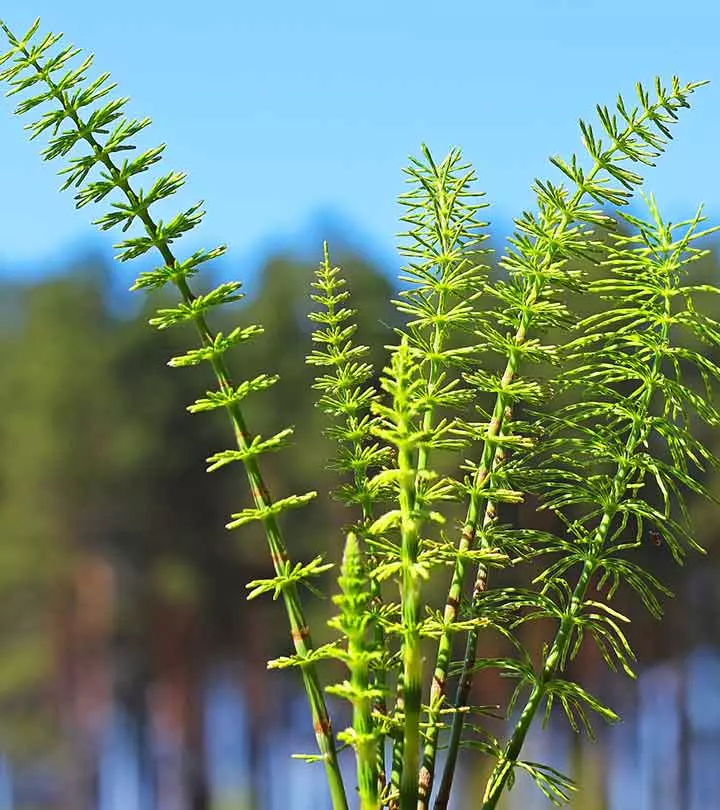




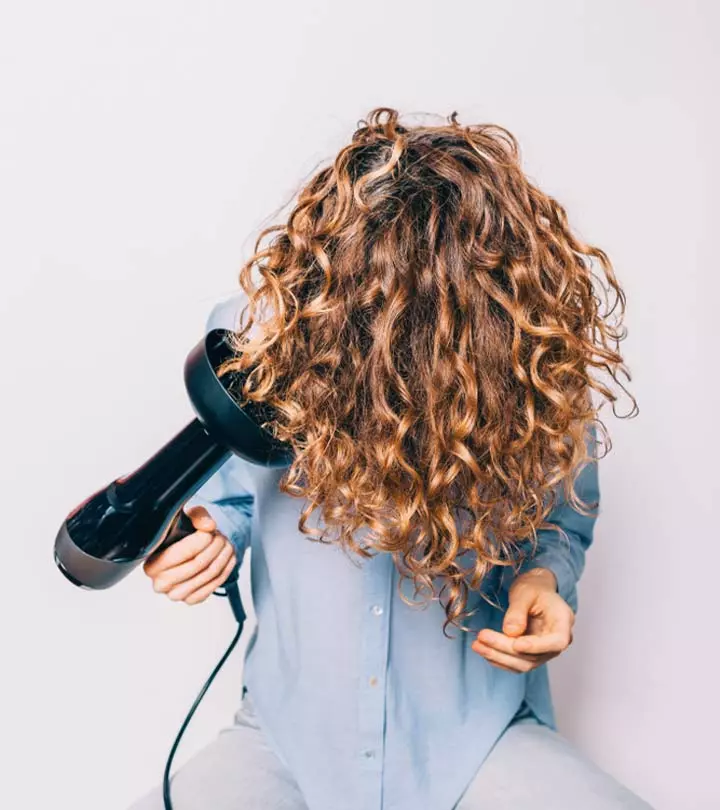
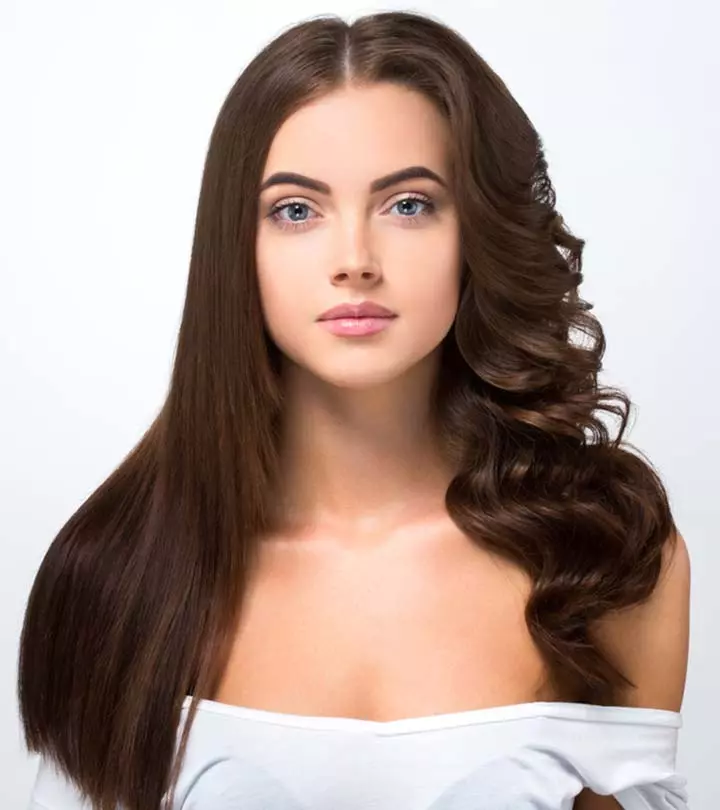
Community Experiences
Join the conversation and become a part of our empowering community! Share your stories, experiences, and insights to connect with other beauty, lifestyle, and health enthusiasts.